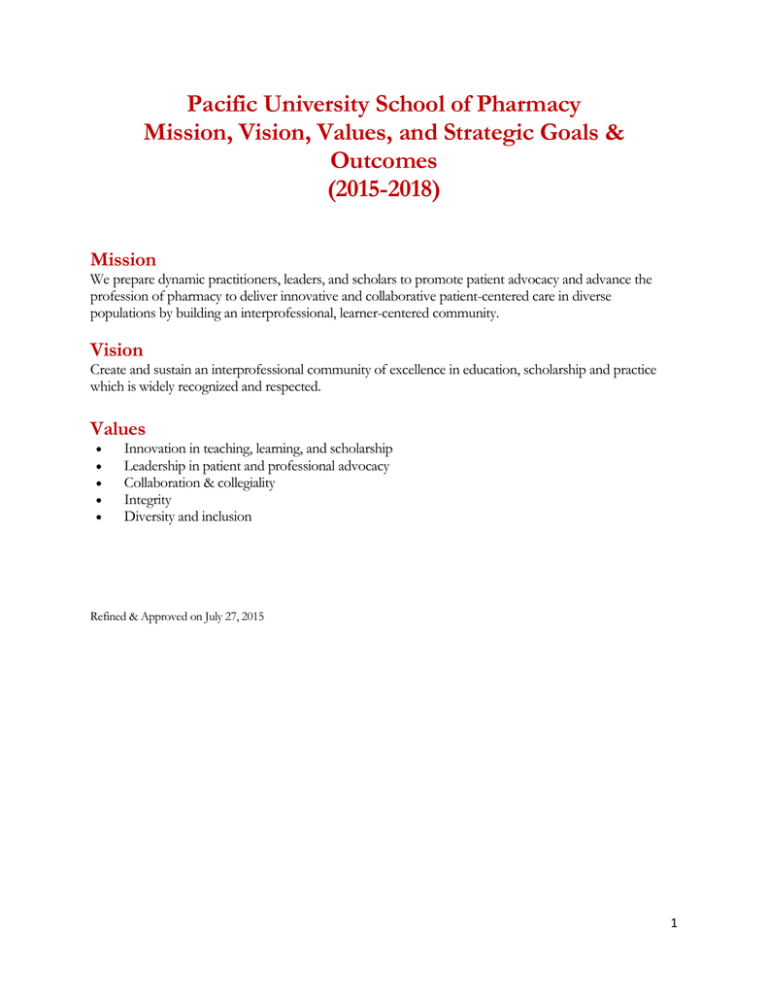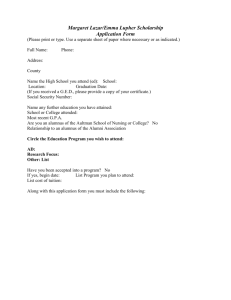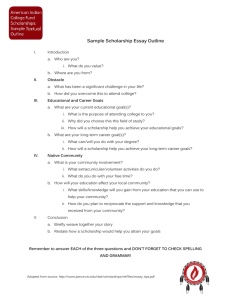Pacific University School of Pharmacy Outcomes (2015-2018)
advertisement

Pacific University School of Pharmacy Mission, Vision, Values, and Strategic Goals & Outcomes (2015-2018) Mission We prepare dynamic practitioners, leaders, and scholars to promote patient advocacy and advance the profession of pharmacy to deliver innovative and collaborative patient-centered care in diverse populations by building an interprofessional, learner-centered community. Vision Create and sustain an interprofessional community of excellence in education, scholarship and practice which is widely recognized and respected. Values • • • • • Innovation in teaching, learning, and scholarship Leadership in patient and professional advocacy Collaboration & collegiality Integrity Diversity and inclusion Refined & Approved on July 27, 2015 1 Strategic Goals and Outcomes Goal 1: Develop and implement focus area(s) that is/are meaningful and attractive to faculty, staff, students, candidates and stakeholders that highlight our program’s strengths. – Identify or create curricular connections to highlight niches – Ask faculty, staff, students, alumni, and other stakeholders what they think we do best – Adjust/refine curriculum according to our niches – Seek internal and external perspectives to assist in marketing of the School – Prepare graduate to engage in innovative activities by using creative thinking to envision better ways of accomplishing professional goals – Develop professionalism and foster leadership in administrators, faculty, preceptors, staff, and students – Foster dynamic practitioners Goal 2: Aggressively market the positive aspects of our program. – Publish more information about the School (statistics, residency, graduation, etc.) – Use our faculty, staff, students, alumni, and other stakeholders in marketing (successes story-telling) – Market according to niche area(s) – Identify and align the strategies already in place – Promote our marketing identity (collegiality and learner-centered) – Focus marketing to obtain the students/faculty/staff we want – Develop a marketing plan for the School – Use social media to increase visibility Goal 3: Improve interprofessional and intraprofessional interactions across P1, P2 and P3 years and alumni across a continuum. – – – – – – – – – – – Intentionally creating curricular touch points across cohorts Develop a peer mentor model with common activities Alumni mentoring for students on career development Classes provide education and perspectives to each other Develop IPPE and APPE collaborations at current hub areas Increase activity of and participation in student organizations Use the 2-hour break time as a selling point for student development and involve School’s and Preceptor’s Advisory Board members in leadership training for students Promote patient advocacy Model professionalism by encouraging faculty and staff to actively and visibly participate in professional organizations, meetings, and symbolic events Increase P1, P2, P3 integrated activities Expand interprofessional education 2 Establish relationships to include NP, MD, RN, DO, naturopath Students are able to contribute as a member of an interprofessional collaborative patient care team – Reposition the curriculum to meet future challenges – Design purposeful tracks within the curriculum at School and CHP – Create opportunities to foster the skills, attitudes, and values necessary for selfdirected lifelong learning • • Goal 4: Strengthen internal and external collaboration and increase presence with community organizations (regional and national groups; scholarship for service). – Immunization and vaccinations • Providing service to community (public health services) – Identifying local partners willing to provide scholarships – Collaborate with community providers and make more connections – What does our community need (meet an unmet need)? – Teach students to be more involved in the community – Educate students in the importance of service to medically underserved areas locally and globally – Foster a culture of collaboration with other administrations of the university. Goal 5: Professional Development and Scholarship – Create a culture of collaborative scholarship – Systematically assess the productivity of faculty in scholarship, teaching effectiveness, and professional and community service – Promote faculty and staff recruitment and retention – Promote faculty and staff service contributions to the program and the community at large – Optimize opportunities for students to become involved in scholarship – Foster student research training and faculty productivity in discovery oriented scholarship – Improve grant writing support infrastructure – Identify and assess types of scholarship at School – Develop and centralize support for andragogical scholarship Approved on July 27, 2015 3






